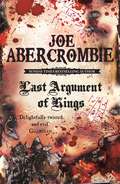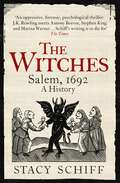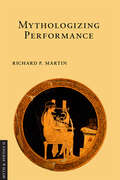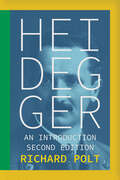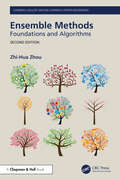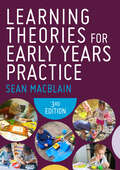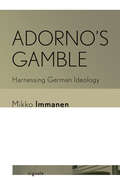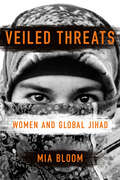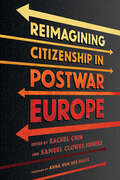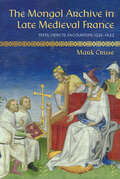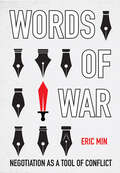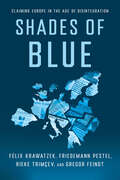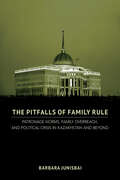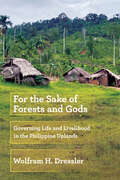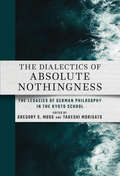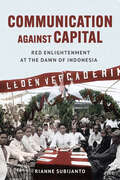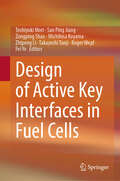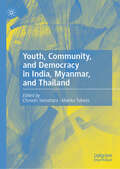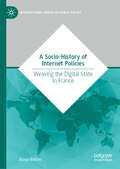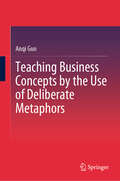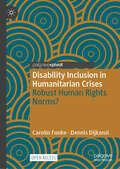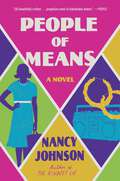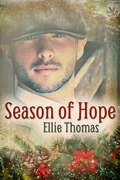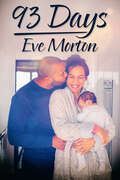- Table View
- List View
Last Argument Of Kings: Book Three (The First Law #Bk. 3)
by Joe AbercrombieThe end is coming.Logen Ninefingers might only have one more fight in him - but it's going to be a big one. Battle rages across the North, the King of the Northmen still stands firm, and there's only one man who can stop him. His oldest friend, and his oldest enemy. It's past time for the Bloody-Nine to come home.With too many masters and too little time, Superior Glokta is fighting a different kind of war. A secret struggle in which no-one is safe, and no-one can be trusted. His days with a sword are far behind him. It's a good thing blackmail, threats and torture still work well enough.Jezal dan Luthar has decided that winning glory is far too painful, and turned his back on soldiering for a simple life with the woman he loves. But love can be painful too, and glory has a nasty habit of creeping up on a man when he least expects it.While the King of the Union lies on his deathbead, the peasants revolt and the nobles scramble to steal his crown. No-one believes that the shadow of war is falling across the very heart of the Union. The First of the Magi has a plan to save the world, as he always does. But there are risks. There is no risk more terrible, after all, than to break the First Law...
The Witches: Salem, 1692: A History
by Stacy Schiff'An oppressive, forensic, psychological thriller: J.K. Rowling meets Antony Beevor, Stephen King and Marina Warner ... Schiff's writing is to die for' THE TIMESIt began in 1692, over an exceptionally raw Massachusetts winter, when a minister's niece started to scream and convulse. It ended less than a year later, but not before panic had infected the entire colony, nineteen men and women had been hanged, and a band of adolescent girls had brought Massachusetts to its knees.Vividly capturing the dark, unsettled atmosphere of seventeenth-century America, Stacy Schiff's magisterial history draws us into this anxious time. She shows us how quickly the epidemic of accusations, trials, and executions span out of control. Above all, Schiff's astonishing research reveals details and complexity that few other historians have seen.
Mythologizing Performance (Myth and Poetics II)
by Richard P. MartinBuilding on numerous original close readings of works by Homer, Hesiod, and other ancient Greek poets, Richard P. Martin articulates a broad and precise poetics of archaic Greek verse. The ancient Greek hexameter poetry of such works as the Iliad and the Odyssey differ from most modern verbal art because it was composed for live, face-to-face performance, often in a competitive setting, before an audience well versed in mythological and ritual lore. The essays collected here span Martin's acclaimed career and explore ways of reading this poetic heritage using principles and evidence from the comparative study of oral traditions, literary and speech-act theories, and the ethnographic record.Among topics analyzed in depth are the narrative structures of Homer's epics, the Hesiodic Works and Days, and the Homeric Hymn to Apollo; the characterization of poetic and musical performers within the poems; the social context for verses ascribed to the legendary singer Orpheus; the significance of various rituals as stylized by poetic performances; and the interrelations, at the level of diction and theme, among the major genres of epic and hymn, as well as "genres of speaking" such as lament, praise, advice, and proverbial wisdom.
Heidegger: An Introduction
by Richard PoltHeidegger provides a lively and accessible introduction to one of the most influential and intellectually demanding philosophers of the modern era. Covering the entire range of Heidegger's thought but focusing on his key work, Being and Time, Richard Polt skillfully guides readers through the texts using clear examples and vivid language. This second edition features biographical insights, illuminates Heidegger's intellectual development, and orients readers to his most important and influential writings.Polt has thoroughly revised the text, enriching and updating his interpretations with major primary and secondary sources published since the first edition was released in 1999. A new discussion of Heidegger's entanglement with Nazism draws on the philosopher's lectures, seminars, and journals. Engaging and thought-provoking, Heidegger invites readers to learn to swim in the often turbulent waters of Heidegger's questioning of Being.
Ensemble Methods: Foundations and Algorithms (Chapman & Hall/CRC Machine Learning & Pattern Recognition)
by Zhi-Hua ZhouEnsemble methods that train multiple learners and then combine them to use, with Boosting and Bagging as representatives, are well-known machine learning approaches. It has become common sense that an ensemble is usually significantly more accurate than a single learner, and ensemble methods have already achieved great success in various real-world tasks.Twelve years have passed since the publication of the first edition of the book in 2012 (Japanese and Chinese versions published in 2017 and 2020, respectively). Many significant advances in this field have been developed. First, many theoretical issues have been tackled, for example, the fundamental question of why AdaBoost seems resistant to overfitting gets addressed, so that now we understand much more about the essence of ensemble methods. Second, ensemble methods have been well developed in more machine learning fields, e.g., isolation forest in anomaly detection, so that now we have powerful ensemble methods for tasks beyond conventional supervised learning.Third, ensemble mechanisms have also been found helpful in emerging areas such as deep learning and online learning. This edition expands on the previous one with additional content to reflect the significant advances in the field, and is written in a concise but comprehensive style to be approachable to readers new to the subject.
Learning Theories for Early Years Practice
by Sean MacBlainThis third edition showcases captivating full-color photographs, compelling case studies, engaging activities, and thought-provoking discussion points. Each chapter delves into the theorist and the theory, illustrating their practical applications, strengths, weaknesses, and connections to other theorists. This indispensable resource empowers students to create inclusive learning environments. New to this edition: New chapter on Barbara Rogoff and children in cultural communities Expanded final section on theorists in the contemporary world, covering vital issues such as mental health, diversity, gender, special educational needs, play, valuing our environments, and artificial intelligence Updated case studies and examples
Learning Theories for Early Years Practice
by Sean MacBlainThis third edition showcases captivating full-color photographs, compelling case studies, engaging activities, and thought-provoking discussion points. Each chapter delves into the theorist and the theory, illustrating their practical applications, strengths, weaknesses, and connections to other theorists. This indispensable resource empowers students to create inclusive learning environments. New to this edition: New chapter on Barbara Rogoff and children in cultural communities Expanded final section on theorists in the contemporary world, covering vital issues such as mental health, diversity, gender, special educational needs, play, valuing our environments, and artificial intelligence Updated case studies and examples
Adorno's Gamble: Harnessing German Ideology (Signale: Modern German Letters, Cultures, and Thought)
by Mikko ImmanenAdorno's Gamble offers a startling reinterpretation of the evolution of Theodor W. Adorno's thought, usually seen as a mix of critical Marxism, Freudian psychoanalysis, aesthetic modernism, and Jewish tradition. Mikko Immanen argues for another, previously unacknowledged source of Adorno's thinking on instrumental reason, dialectic of enlightenment, and frailty of democracy: the intellectual underpinnings of Germany's "conservative revolutionary" movement of the 1920s.In a dramatic reappraisal of the leading light of the Frankfurt School, Immanen follows Adorno's path of philosophical development from the late Weimar era through years in exile to the postwar period, establishing his debt to thinkers of radical conservative bent. In particular, he focuses on Adorno's enduring, and daring, effort to harness two of the most infamous works from this tradition—Oswald Spengler's Decline of the West and Ludwig Klages's The Spirit as Adversary of the Soul—and to repurpose their reactionary teachings for emancipatory ends.
Veiled Threats: Women and Global Jihad
by Mia BloomVeiled Threats challenges the idea that women in violent terrorist groups lack agency. Too often, these women are assumed to be controlled by men: their fathers, their husbands, or some other male relative. Mia Bloom contests this narrow understanding. Although extremist groups often control different aspects of women's lives, including their religious obligations or dress, jihadi women have asserted themselves in myriad ways. Bloom interrogates the prevailing perceptions about women's involvement in violent extremism exclusively as victims: manipulated, drugged, or coerced. Following her pioneering work on women in Bombshell, Bloom lifts the veil of the secret world of women in jihadi groups to provide a nuanced and complex explanation of their motivations and challenge misperceptions about women's agency. Veiled Threats explores the range of roles of the women involved in jihad—not only across secular and religious groups but within affiliated religious groups—and examines how these extremist groups have used rape as a weapon of war. Bloom explains how women are used and abused, deployed and destroyed, and the many ways in which their roles in terrorism have evolved over the past three decades.
Reimagining Citizenship in Postwar Europe
by Samuel Clowes Huneke Rachel Chin Anna von der GoltzReimagining Citizenship in Postwar Europe maps the generation and growth of novel forms of belonging in the years after World War II, crisscrossing the continent from Madrid to Warsaw and from Athens to London. Even as Europe struggled to rebuild, new forms of identity, statehood, and citizenship were beginning to take shape.Rachel Chin and Samuel Clowes Huneke bring together a diverse group of scholars to illustrate how citizenship was reimagined in the postwar decades in unusual settings and unexpected ways, while highlighting how ordinary citizens, living in democratic and authoritarian regimes alike, struggled to forge new kinds of belonging through which to assert their human rights and dignity. Ultimately, Reimagining Citizenship in Postwar Europe contends that if we are to grapple with fraying citizenship in the twenty-first century, we must first look to when, how, and why citizenship originated in the calamitous years after World War II.
The Mongol Archive in Late Medieval France: Texts, Objects, Encounters, 1221–1422 (Medieval Societies, Religions, and Cultures)
by Mark CruseThe Mongol Archive in Late Medieval France is the first comprehensive study of contact between France and the Mongols in the late Middle Ages. As these realms expanded across Eurasia—the French through crusade and settlement, the Mongols through conquest—their encounters altered each other's understanding of the world and their place in it. The Mongol influence on French culture is visible in what Mark Cruse calls the Mongol archive—a wide range of materials including chronicles, crusade treatises, encyclopedias, manuscript illuminations, maps, romances, and travel accounts—revealing how the French court made sense of a people previously unknown to the European intellectual tradition. Cruse mines this archive of Franco-Mongol contact to reassess France's place in the continental history of medieval Eurasia. By comparing the French and Mongol courts, Cruse shows how their similarities allowed meaningful communication between them and highlights the surprising connections—diplomatic, intellectual, and genealogical—across vast distances. The library of King Charles V (r. 1364–1380), one of the largest in medieval Europe, is a monument to the richness of these encounters, which anticipate the global interconnectedness of the modern world. Ultimately, the innovative approach in The Mongol Archive in Late Medieval France toward French conceptions of and relations with the Mongols demonstrates how a global perspective transforms our understanding of the medieval world.
Words of War: Negotiation as a Tool of Conflict (Cornell Studies in Security Affairs)
by Eric MinIn Words of War, Eric Min pulls back the curtain on when, why, and how belligerents negotiate while fighting. Of all interstate conflicts across the last two centuries, two-thirds have ended through negotiated agreement. Wartime diplomacy is thus commonly seen as a costless and mechanical process solely designed to end fighting. But as Min argues, that wartime negotiations are not just peacemaking tools. They are in fact a highly strategic activity that can also help states manage, fight, and potentially win wars. To demonstrate that wartime talk does more than simply end hostilities, Min distinguishes between two kinds of negotiations: sincere and insincere. Whereas sincere negotiations are good faithhonest attempts to reach peace, insincere negotiations exploit diplomacy for some other purpose, such as currying gaining political support or remobilizing forces. Two factors determine whether and how belligerents will negotiate: the amount of pressure that outside parties can place on belligerents them to engage in diplomacy, and information obtained from fighting on the battlefield. Combining statistical and computational text analyses with qualitative case studies ranging from the War of the Roman Republic to the Korean War, Min shows that negotiations are more likely to occur with strong external pressures. A combination of such pressures and indeterminate battlefield activity, however, will most likely leads to insincere negotiations that may stoke fighting rather than end it. By revealing that diplomacy can sometimes be counterproductive to peace, Words of War compels us to rethink the assumption that it "cannot hurt" to promote diplomacy during war.
Shades of Blue: Claiming Europe in the Age of Disintegration
by Félix Krawatzek Friedemann Pestel Rieke Trimcev Gregor FeindtIn Shades of Blue, Félix Krawatzek, Friedemann Pestel, Rieke Trimçev, and Gregor Feindt investigate the political project of "Europe" as it oscillates between the extremes of expectations of an ever-wider integration and fear of disintegration. The authors interrogate and chart the space between these polarities by tracking the many competing conceptions of Europe in European public discourse and relate these meanings to national, regional, and ideological divisions. Based on qualitative discourse analyses of newspaper articles from six European Union member states between 2004 and 2023, Shades of Blue shifts how we think about Europe's integration and disintegration and offers a new perspective on Europeanization. With twelve debates chronicling Europe's past and discussing the implications for Europe's future, these authors uncover how politicians, intellectuals, and journalists negotiate European senses of belonging. Shades of Blue moves beyond the binaries of hope and despair to uncover a more nuanced picture of Europe.
The Pitfalls of Family Rule: Patronage Norms, Family Overreach, and Political Crisis in Kazakhstan and Beyond
by Barbara JunisbaiIn The Pitfalls of Family Rule, Barbara Junisbai questions the conceptual divide separating democracy from nondemocracy as well as that separating "strong" authoritarian rulers from "weak" ones. Focusing on patronage, endemic to post-Soviet Eurasia but also present the world over, she untangles the spoils agreements that bind elites to strongman presidents. Incorporating multiple case studies, including an in-depth investigation into Kazakhstan over the span of twenty plus years, Junisbai demonstrates the power of institutional norms to hold seemingly unconstrainable rulers accountable in surprising and unexpected ways. "Strong" autocrats can stumble even when they set in place robust, pro-presidential institutions, while "weak" autocrats can endure by upholding normative contracts that elites perceive as fair and just. An important lesson emerges from The Pitfalls of Family Rule: not even the most personalist of regimes functions free of rules. The institutions over which autocrats claim control also lay claim over them.
For the Sake of Forests and Gods: Governing Life and Livelihood in the Philippine Uplands
by Wolfram H. DresslerFor the Sake of Forests and Gods documents the consequences of nonstate actors impinging on the existence of Indigenous peoples in the remote highlands of Palawan Island, the Philippines. Nimble, focused, and well-funded, religious and environmental organizations increasingly assume governmental authority over the lives and livelihoods of the Pala'wan people within their ancestral territories.Wolfram H. Dressler traces these actors' history and contemporary practices, revealing how they bypass the state to govern the less governed. In the highlands, environmental NGOs valorize customary objects and practices to suppress swidden and support forest conservation, while evangelical missionaries regulate Pala'wan beliefs, health, and hygiene.Bridging material studies and biopolitics, For the Sake of Forests and Gods explores how these nonstate actors use customary objects for comprehensive reforms of Pala'wan bodies and souls, centering on how the unique properties of the Tingkep basket mediate nonstate biopower. These reforms impact highlanders differently: some adopt biopolitical ideals willingly, others for political and economic gain. Yet others resist interventions, prioritizing family livelihoods. Ultimately, Dressler argues that Indigenous sovereignty matters more than ever as nonstate biopower intensifies in Southeast Asia's uplands.
The Dialectics of Absolute Nothingness: The Legacies of German Philosophy in the Kyoto School
by Gregory S. Moss Takeshi MorisatoThe Dialectics of Absolute Nothingness investigates the appropriations, critiques, and innovative interpretations of German philosophy by the Kyoto School, showing how central concepts of German philosophical traditions found a place within non-Western frameworks such as Zen and Pure Land Buddhism, thereby transcending the original Western context.Kyoto School philosophers critically engaged with their own tradition and grappled with classical German philosophy from Kant to German Idealism and from Neo-Kantianism to German phenomenology. Far from mimicking the Western tradition, Nishida, Tanabe, Nishitani and other Japanese philosophers overcame their sense of alienation from European philosophy by making its concepts their own and advancing their ideas as a hybrid of European and Japanese philosophy through which they developed their own world historical perspective.Showcasing the ways that Kyoto School philosophers internalized German philosophy and generated their own original perspectives, The Dialectics of Absolute Nothingness demonstrates the Kyoto School's potential for culturally diversifying the study of German philosophy and paves the way for the comprehensive study of Asian philosophy in European and global contexts.
Communication against Capital: Red Enlightenment at the Dawn of Indonesia (Cornell Modern Indonesia Project)
by Rianne SubijantoCommunication against Capital explores the revolutionary communication strategies of the pergerakan merah, the anticolonial "red movement" in 1920s Indonesia. Rianne Subijanto tells the story of ordinary lower-class women and children and people of diverse races and ethnicities who waged their battles against Dutch colonialism within multiple arenas of communication, including political associations, assemblies, printed matter, schools, and shipping lines. Existing communication technologies were repurposed into mechanisms of struggle and used as weapons in anticolonial and anticapitalist resistance. In this process, communist ideas merged with ideals drawn from the Enlightenment to shape the emancipatory spirit of Indonesians. This red enlightenment motivated the production of revolutionary communication strategies of mobilization. Subijanto's innovative work shows that the novel techniques of the pergerakan merah served to shift anticolonial mobilization in Indonesia from warfare to modern forms of communication.
Design of Active Key Interfaces in Fuel Cells
by San Ping Jiang Toshiyuki Mori Michihisa Koyama Zongping Shao Zhipeng Li Takayoshi Tanji Roger Wepf Fei YeThis book focuses on the multidisciplinary teamwork for the design of key interfaces in fuel cell devices. It covers the fabrication, modelling, and operando-microanalysis sections in each chapter. Also, each chapter in the book consists of the introduction of basic theory, representative experimental results, and future prospects in each field. The book is an edited volume, intended to serve as an introductory textbook in multidisciplinary research work for the design and development of fuel cells. To fully enjoy the multidisciplinary research activities in fuel cell field, the beginners need to learn the basic knowledge and experimental data in each field. Compared with the published introductory textbooks in the field of science and engineering of fuel cells, this book has the following advantages. Firstly, it is an introductory textbook of multidisciplinary work for the design and development field of intermediate temperature (IT) solid oxide fuel cells (IT-SOFCs) and high-temperature polymer electrolyte fuel cells (HT-PEFCs) . And at the same time, this book is convenient for practical research implementation in R & D of those IT-SOFC and HT-PEFC devices. Secondly recent research topics with sufficient references are included in each chapter. Scientists and engineers in the fuel cell field will obtain useful knowledge in critical review chapters in the fabrication, modeling, and operando-microanalysis fields. Finally experimental results are closely combined with the cutting edge of scientific research work in the IT-SOFC and HT-PEFC materials and devices field. For all these reasons, this book is a useful start-up in multidisciplinary work for R & D of IT-SOFC and HT-PEFC devices.
Youth, Community, and Democracy in India, Myanmar, and Thailand
by Makiko Takeda Chosein YamahataThis book provides a comprehensive understanding of the struggles of youth in India, Myanmar, and Thailand towards the creation of a freer, more inclusive, plural, and equal society. Chapter contributions in the book include analytical explanations and insightful debates on key issues, progress, and challenges, by a team of international and local researchers. The world is currently witnessing a surge in innovative, networked, and technology-driven freedom movements across Asian societies. Youth and community-driven initiatives in India, Myanmar, and Thailand are being adapted and localized to foster much-needed development, human security, stability, and social progress in a responsible, objective, and selfless manner. These movements, characterized by the unwavering participation of youth including Gen Z, are being continuously tested and implemented across Asian societies, highlighting a promising trend in the evolution of grassroots social movements. In this context, this book explores the strengths of South/Southeast Asia, examining grassroots changes through various case studies, and the emergence of broader possibilities for societal transformation across multiple chapters. Chapter contributors address several critical issues, including the spirit and practice of the responsibility to protest that drives youth uprisings against authoritarian regimes, the struggles of highland communities, environmental justice, resistance movements, anti-coup efforts, generational change, peace prospects, democratic foreign policy, and grassroots democracy. The book serves as a valuable resource for students, policy analysts, and anyone seeking a comprehensive understanding of the nature, processes, and challenges faced by youth for their societies.
A Socio-History of Internet Policies: Weaving the Digital State in France (International Series on Public Policy)
by Anne BellonThis book examines the development of internet policymaking over the last forty years. Drawing on evidence from France and elsewhere, it adopts a sociohistorical perspective to offer insights into the ways democratic states regulate the internet and digital transformation more generally. Adopting a chronological approach and utilising both policy analysis and interviews with key actors, it retells the changing role of the state in internet regulation since the inception of the internet to the present day. It also explores the complex relationships between public administrations and internet organizations, and considers whether states are really capable of governing the digital space. It will appeal to all those interested in public policy, digital studies, sociology and communication studies.
Teaching Business Concepts by the Use of Deliberate Metaphors
by Anqi GuoThis book discusses the underlying metaphors of some important business principles and terms and positive teaching effects from deliberately implanting those metaphors in business lessons. It introduces original metaphors creatively used in live webcast courses which introduce difficult economic concepts to netizens. The deliberate metaphor is considered to represent a new dimension of metaphor, the communicative dimension. The book explores the communicative effect of deliberate metaphors and proves its effectiveness in teaching difficult business concepts. This book explores different uses of deliberate metaphors designed to support the teaching of business concepts and discusses two teaching experiments done to explore their effectiveness. Results showed that a focused design using deliberate metaphors in the lectures improved test performance, while a scattered design using deliberate metaphors used in lectures significantly increased students’ interest in the lectures.
Disability Inclusion in Humanitarian Crises: Robust Human Rights Norms? (Palgrave Studies in Disability and International Development)
by Dennis Dijkzeul Carolin FunkeThis open access book studies disability inclusion in humanitarian crises. It addresses the challenges of recognizing and including persons with disabilities and indicates the degree to which disability is being mainstreamed in international law and humanitarian action. Further, it explores how international organizations have promoted a rights-based understanding of disability in international law, and to what extent this understanding has gained acceptance in humanitarian policy and practice. Theoretically, Funke and Dijkzeul explore the robustness of the disability inclusion norm cluster during processes of institutionalization, translation, and implementation. The book examines these processes from a multi-level perspective, which involves a variety of actors beyond states, including organizations of persons with disabilities. Situating their analysis within the literature on humanitarian action and development, the authors argue for an increased focus on processes “below” the international level in international relations and international law scholarship to better understand disability inclusion.
People of Means: A Novel
by Nancy JohnsonOne of People magazine's most anticipated books of 2025!From the acclaimed author of The Kindest Lie, a propulsive novel about a mother and daughter each seeking justice and following their dreams in 1960s Nashville and 1990s Chicago; perfect for readers of Brit Bennett and Tayari Jones."People of Means left me breathless! A beautifully crafted story...profound and sharp."—Sadeqa Johnson New York Times bestselling author of The House of EveTwo women. Two pivotal moments. One dream for justice and equality.In the fall of 1959, Freda Gilroy arrives on the campus of Fisk University full of hope, carrying a suitcase and the voice of her father telling her she’s part of a family legacy of greatness. Soon, the ugliness of the Jim Crow South intrudes, and she’s thrust into a movement for social change. Freda is reluctant to get involved, torn between a soon-to-be doctor her parents approve of and an audacious young man willing to risk it all in the name of justice. Freda finds herself caught between two worlds, and two loves, and must decide how much she’s willing to sacrifice for the advancement of her people.In 1992 Chicago, Freda’s daughter Tulip is an ambitious PR professional on track for an exciting career, if workplace politics and racial microaggressions don’t get in her way. But with the ruling in the Rodney King trial weighing heavily on her, Tulip feels called to action. When she makes an irreversible professional misstep as she seeks to uplift her community, she must decide, just like her mother had three decades prior, what she’s willing to risk in the name of justice and equality.Insightful, evocative, and richly imagined with stories of hidden history, People of Means is an emotional tour de force that offers a glimpse into the quest for racial equality, the pursuit of personal and communal success, and the power of love and family ties."A memorable story of mothers and daughters, family dynamics, the complicated meaning of success, the pull of love, and the fight for racial equality, People of Means is a timely look at who we are as a nation—and who we can become, if only we have the courage to follow our hearts." —Kristin Harmel, New York Times bestselling author of The Paris Daughter
Season of Hope
by Ellie ThomasSequel to Season of JoyBy the beginning of 1944, Walter Webb and Stanley Gardner have been together for twenty years. They live quietly above the grocer’s shop on Cheltenham’s Lower High Street, outwardly two middle-aged bachelors sharing a home.Cheltenham might have escaped the worst of the bombing raids, but the privations and dangers of the second war have put a strain on the whole community. This includes ongoing concern about loved ones on active duty. Stanley’s beloved nephew Jack is serving in Italy, while engaged in the fiercely fought Battle for Rome.Walter worries about the strain on Stanley’s health, never robust after the Great War, as they both deal with family issues and direct threats from the enemy.As St. Valentine’s Day approaches, can Walter and Stanley find solace in the hope of a peaceful shared future after the war?
93 Days
by Eve MortonEthan doesn't want to push anyone, especially his wife Angie, to do anything they don't want to do. So when 93 days have passed since their first daughter's birth, and he and his wife Angie still haven't had sex, he's fine with it. Really.But when Angie drops hints that she's more than ready -- and Ethan still ignores them -- they both must confront what is actually going on if they want to be parents as well as lovers all over again. Can they survive the transition? When they do meet again, alone and with a night free from the baby, will it be the same? Moreover, do they want it to be?
